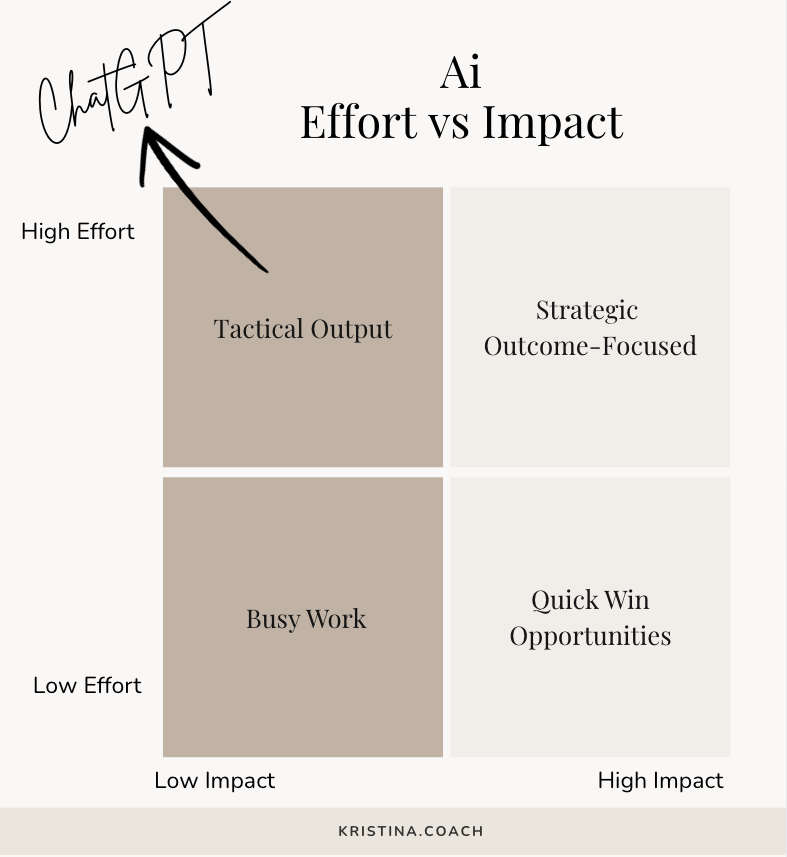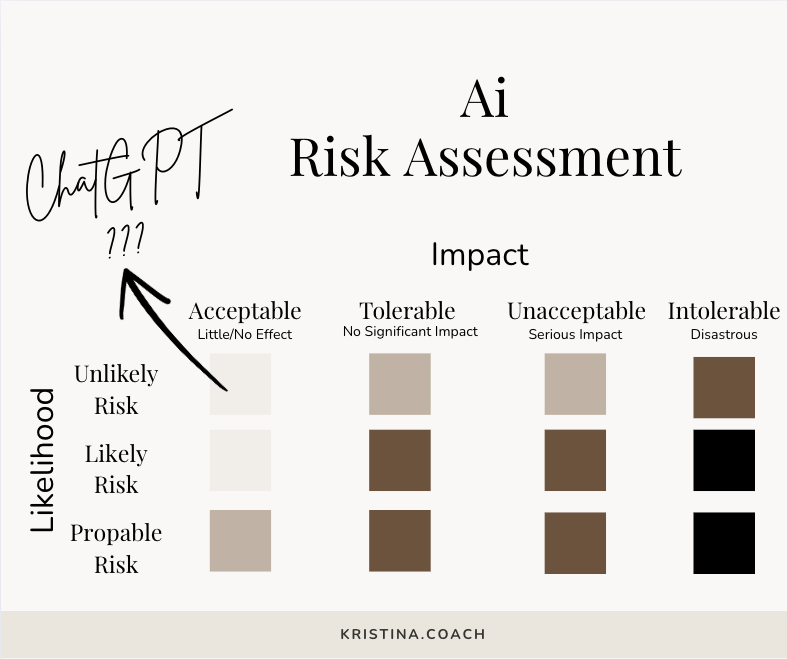AI's Impact on Modern Leadership

Short on time? Listen to the AI-powered audio version—no scrolling needed.
Leading with Trust—How AI Shapes Authenticity and Performance
I recently launched my coaching practice knowing full-well from experience that there is no good time to start a business.
“Start by starting” might work for some as a catalyzing mantra for entrepreneurial success, but I’ve always regarded it as a flippant catchphrase that undermines the very real excitement, trepidation, expansive workload, and sheer terror of jumping into the unknown without the safety nets of predictability and familiarity. But in this case, I heeded the advice and just started.
After deciding on a date for the launch (to coincide with International Coaching Week), I strategized my workback plan to flex around the perks of self-employment: flexible timelines, movable goal posts, and deadlines that don’t need to heed the forcing function of “progress over perfection”.
As is often the case, my plans derailed slightly as I got closer to my deadline and life (as it generally does) got lifey. So, I used ChatGPT as a productivity power-up to speed up the high effort, low impact jobs I had in front of me.

To be honest, the end-result was far better than anything I could have produced given the time crunch I was in. And, my overall risk assessment of using Ai for business functions like marketing and advertising was seemingly low… or so I thought.

However, while my own mental model of using generative Ai as a productivity power-up (particularly as a solopreneur) increased my confidence in producing low-risk outputs, I wasn’t prepared for other people’s perceptions of that choice.
Ai isn't just shifting what we do at work, it's shifting how we perceive work being done.
And that perception, it turns out, flies in the face of historical contexts where early adoption of tech, while up against some latent hesitation, has always been generally regarded as innovative, trailblazing, and even disruptive.
“It’s so nice reading you!” one of my dear colleagues replied in a personal, private message exchange between the two of us after reaching out following my ChatGPT-written announcement.
As a celebrated Marketing exec, I knew they were referring to the distinction between my own quirky self-expression and the generic voice and tone of The Bot – a particularly apt commentary considering the former’s foundational necessity for personal branding.
To be fair, I was starting to see more and more comments across the Internet in reaction to implied ChatGPT use on published content outside my own: “I don’t think I’ll ever use an em-dash again now that it’s so prevalent on Ai-written content”, or “If I see one more snappy, soundbite slogan…”
Mea culpa: My own business tagline was inspired by a single ChatGPT brainstorming session.
So what gives? In an era where business and governments champion the use of Ai, why are so many individuals judging its use – and in many cases, shaming those who use it?
Since I have a background in human factors, I was curious to dig into some current (and rapidly evolving) research on humans’ adoption and acceptance of generative Ai content to see if my anecdotal experiences of apprehension – even backlash – of well-crafted Ai outputs might be an outlier or simply a current lifecycle adoption status quo of the common attitudes of the often cautious and tech-averse Early Majority.
It turns out that my initial risk assessment – unlikely risk, with little to no effect – of using ChatGPT for social media posts (and indeed some of my early ChatGPT-edited blog posts as well) was wrong.
Based on my recent feedback and experiences, and backed by research recently published in Organizational Behavior and Human Decision Processes (Volume 188, May 2025), I should have assessed my decision to use ChatGPT as probable risk with tolerable impact to my brand, and my overall use of Ai for business as suitable to high effort level/low impact tactical or busy work.
Oliver Shilke and Martin Reimann’s article The transparency dilemma: How Ai disclosure erodes trust, draws attention to the social dynamics of how the disclosure of AI usage not only affects how people are perceived, but how generative Ai outputs, even when transparently disclosed, are distrusted by others.
Somehow, an innocuous decision to “help me write” inadvertently found me tangled in the broader implications of upholding my own authenticity and legitimacy to others.
As it turns out, we as humans literally have trust issues with Ai.
As astonishingly amazing and paradigm shifting as it can be to our work processes and work outputs, our own ethos as humans is still very much misaligned to Ai's use cases and benefits.
Which begs the question:
When caught between strategic directives to adopt Ai into workflows and operationalizing AI in teams with low trust in its results, what can leaders do?
(Note: I use the term "team" here to describe human teams, and not Human-Ai Teams or HATs which is a rapidly evolving field that I’ll write about further in time)
As someone who has led teams through the majority of tech advancements over the past 25+ years, I offer a few additional perspectives for you to consider alongside your own thoughts, experiences and insights:
If you haven't done so already, consider taking a quick pulse check of your team and their attitudes towards Ai before asking them to use Ai for Ai’s sake. How are they currently using it? What are their perceptions of Ai use? How would they like to use it? You have to be able to name it to tame it, so why not encourage open and honest dialogue about Ai to help normalize its adoption and decrease any hesitations around its use?
Hone in on any issues that come up with respect to trust. Ai doesn’t just raise concerns about legitimacy of outputs, it can even create friction amongst employees based on mistrust as they level up to its use within their own work.
Tech resilient teams are founded upon trust
As a leader, you’re a critical piece to helping support your team’s healthy adoption of Ai. ChatGPT isn’t just a new piece of software that requires upleveling a team’s proficiency like the latest update to Windows 11.
You might foster team trust by:
- Being transparent and honest about Ai use across your organization. Remain candid about any concerns or challenges your team might face as Ai evolves the future of work.
- Encouraging open communication about Ai and what it means to your team’s work. Actively discuss and settle on team agreements for acceptable use of ChatGPT at work, if broader governance hasn’t yet been established.
- Showing empathy for how team members might feel about Ai in relation to their jobs or careers. Hone in on the value individuals bring to the team, and use 1:1 time to identify high effort/high impact projects they can work on to show direct impact alongside Ai use.
- Encouraging growth and development for adopting Ai into work processes. Not everyone is striving to become the next great prompt engineer. Make Ai accessible by encouraging its use for low impact, low effort busy work whether that’s through the use of integrated tools within existing software (like Microsoft Copilot or Zoom Ai Companion) or as next-gen brainstorming tool to replace Google search.
- Being a role model for acceptable Ai use on your team. Create a space where team members can feel safe to experiment by demonstrating what that looks like. Maybe you’re ok with using ChatGPT to summarize sprint planning and sharing out for transparency with other teams, or maybe MidJourney can help to bring to life ideas you have for a low-key slide deck you’re planning to use for internal alignment and buy-in with ecosystem partners.
Whatever approach you take, I invite you to hold your assumptions lightly and check them often during this rapidly evolving time. The mental models you may have formed based on previous experiences may not serve you as well during the paradigm shift that’s occurring – as I learned the hard way.
"Leadership and learning are indispensable to each other" ~ John F. Kennedy
And what about my own entrepreneurial take of using ChatGPT as a tantalizingly free resource to start and grow my business?
Despite the research and my experiences, I probably won’t walk back how I use Ai. Like I suggested, I’ll also check my assumptions more often and will probably be a little bit more conservative in my approach to risk and adjust accordingly.
But I have to remain true to who I am even if that means taking on a little risk. Failing forward is literally one of my own guiding principles in life and leaning into the very latest in tech ensures that I continue to learn and evolve not just by talking the talk, but by walking the walk.
In doing so, I also discovered from my own recent launch that ChatGPT offers unexpected side benefits I hadn't considered. It's one of the reasons I used it to write my business launch post in the first place. It afforded me the balance I needed to step away from work and take care of personal responsibilities that matter more to me than any job or tech tool ever could— time to spend caring for my Dad who has the same kind of dementia as actor Bruce Willis.
And that, I think, is one of the most authentically human—and often overlooked—uses of AI. If technology can give us the freedom to be more present, more human, isn’t that worth a little risk?
So if you’re like me, staring down the ambiguity of launching something new, or you’re guiding your team through change, or figuring out how to thoughtfully bring AI into your own workflows—here’s a gentle reminder: progress isn’t about having all the answers. It's about staying curious, asking better questions, and being willing to move forward anyway.
The future of work isn’t just being built by code and algorithms—it’s literally being shaped by humans like us, doing the messy, meaningful work of leading with curiosity, communicating with clarity, and showing up with heart.
And, yes, very much figuring it out as we go along.
Interested in scaffolding your leadership around the ethical and responsible adoption and use of Ai? Check out The Center for Humane Technology for a wealth of resources and advocacy as we continue to evolve our businesses and our world accordingly.
Written and edited by: Kristina Mausser
